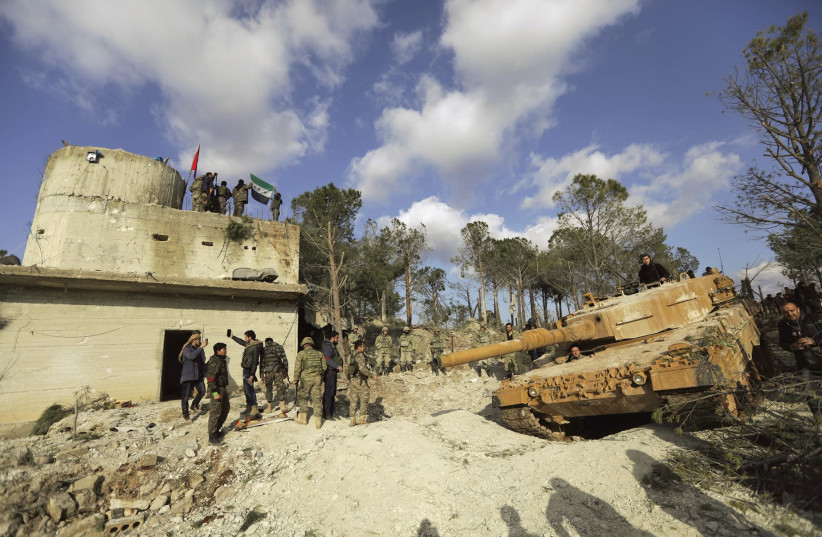Turkey, a member of NATO, appears to have ignored another ISIS leader residing near its border in northern Syria. Ankara has invaded parts of Syria, including Afrin; in areas where it has influence, many Islamic State leaders have been found hiding.
The leader of ISIS in Syria, one of the top five leaders of the militant group, has been killed in a US air strike, the Pentagon said. The first ISIS leader killed near Turkey’s border was its leader Abu Bakr al-Baghdadi, who was killed in a weekend raid by US Special Forces in October 2019. He was killed in a house in Barisha. A second leader, Hashimi al-Qurayshi, was killed in a 2022 raid in Atmeh, which is also four kilometers from Reyhanli in Turkey. Both of them lived a few minutes from the Turkish border. Now Maher Al-Agal, another ISIS leadership member, was killed in a US military drone strike in northwestern Syria this week.
Turkey is a member of NATO and ostensibly has a very large army and good intelligence service. That so many ISIS leaders have taken up residence close to but not in Turkey appears to be a conscious decision by the ISIS leadership that they believe they are safe in northwest Syria.
This area, between Idlib and Afrin, is known to be an area where extremist groups hold sway, some of which are backed by Ankara. These groups include Hayat Tahrir al-Sham, as well as the Turkish-backed Syrian National Army. The SNA was previously a collection of Syrian rebel groups but Ankara has co-opted it to fight Kurds rather than the Syrian regime. As part of that process, some SNA groups became increasingly radicalized and abusive.
Now the US says it has killed Maher Al-Agal. "Extensive planning went into this operation to ensure its successful execution. An initial review indicates there were no civilian casualties," the US Central Command statement said. It was not clear exactly where he was killed, but reports said it was near a village called Kahltan which is near Jindires.

Turkey has influence over this area. It launched an invasion of Afrin in 2018 and attacked the Kurdish area of Afrin, including towns like Jindires. Kurds and other minorities were ethnically cleansed by Turkey and the SNA. Kurdish women were often kidnapped and subjected to abuses, according to reports by human rights groups. Yazidi shrines were destroyed. Ankara later began an illegal occupation that included bringing in settlers, demographic change and transport of olive harvest and other goods out of Afrin. It appears that ISIS members and other extremist groups were able to set up shop as well.
THE RECORD of abuses in this area is clear. In 2018, UNICEF published an account of a 13-year-old child who was living in Jindires. “This is the second time Maizer’s family is being displaced in two years. Originally from Minbij, rural Aleppo, they fled to Jindires in Afrin only to have to flee again last week,” the report said.
“The attacks in Jindires destroyed our home so we had to leave and come to Afrin city,” the boy says. “We had to leave quickly and left all our belongings back home. We sleep on the floor in the basement of an unfinished building in Afrin. It is very cold. We are eight in the family but we only have three blankets to share.”
Turkey is threatening to invade more areas of Syria, which could potentially embolden ISIS. The US-backed Syrian Democratic Forces in eastern Syria helped defeat the global jihadist group in 2019. Many ISIS detainees and their families remain in Syria, often under SDF control in places like Al-Hol camp. However, the ISIS leadership appears to work freely in Idlib and areas near Afrin.
The US carries out airstrikes from time to time against ISIS and other extremist groups. “In addition to being a senior leader within the group, Al-Agal was responsible for aggressively pursuing the development of ISIS networks outside of Iraq and Syria,” the US said this week.
"This strike reaffirms CENTCOM's steadfast commitment to the region and the enduring defeat of ISIS," said Col. Joe Buccino, a CENTCOM spokesperson. "The removal of these ISIS leaders will disrupt the terrorist organization's ability to further plot and carry out global attacks.”
Central Command also noted that "ISIS continues to represent a threat to the US and partners in the region," Buccino added. "CENTCOM maintains a sufficient and sustainable presence in the region and will continue to counter threats against regional security.”
The questions about why ISIS leaders all seem to end up living near the Turkish border – and why Turkey, a member of NATO, never seems to operate against them – remains to be answered.
